Unit 1 What's the matter? Section A Grammar Focus -4c课件(共27张PPT)
文档属性
| 名称 | Unit 1 What's the matter? Section A Grammar Focus -4c课件(共27张PPT) | 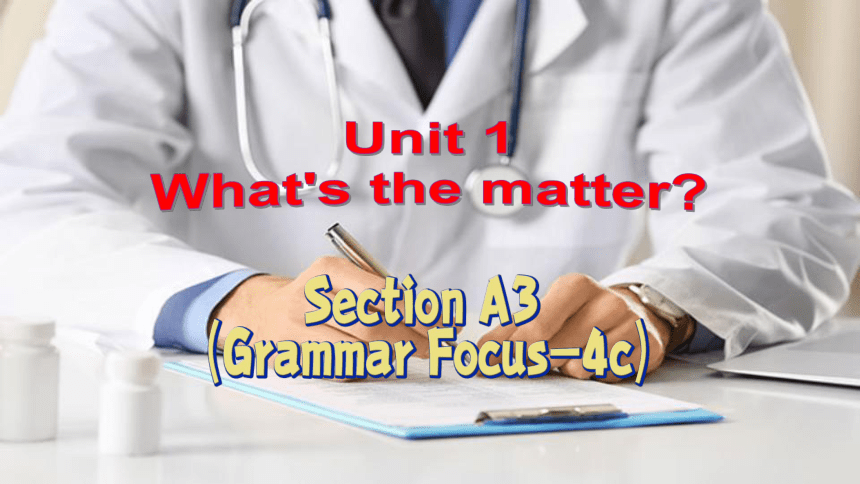 | |
| 格式 | zip | ||
| 文件大小 | 18.2MB | ||
| 资源类型 | 教案 | ||
| 版本资源 | 人教新目标(Go for it)版 | ||
| 科目 | 英语 | ||
| 更新时间 | 2022-05-12 21:40:05 | ||
图片预览

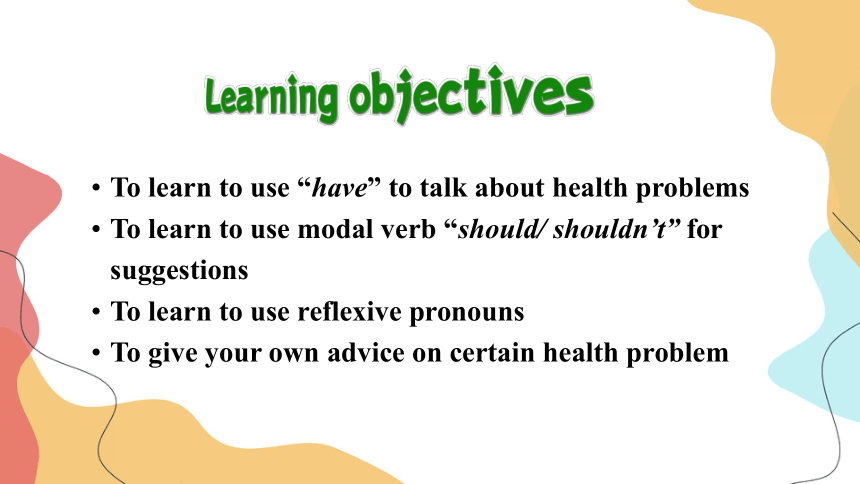
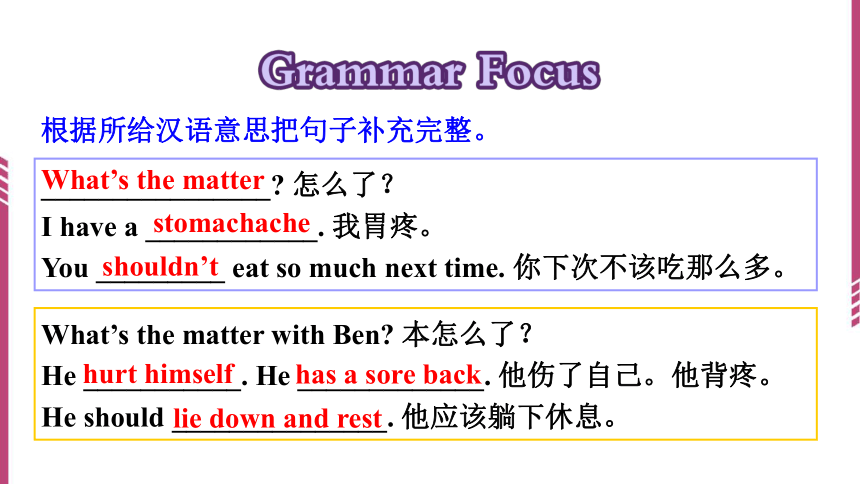
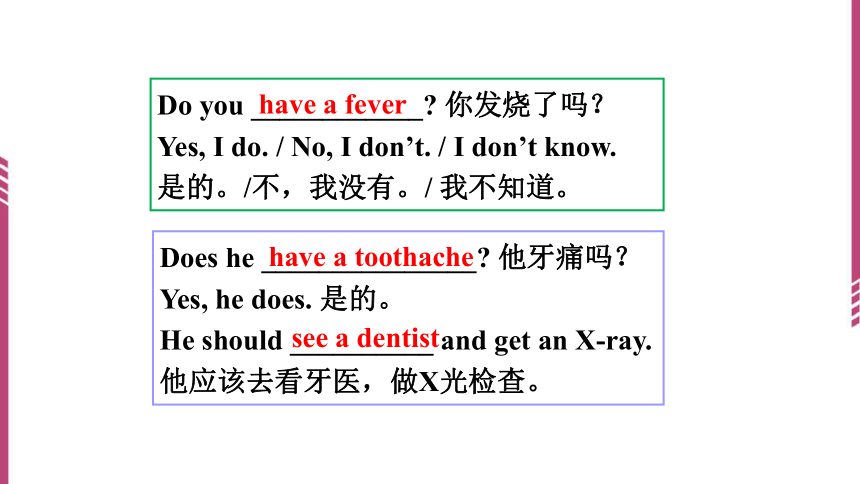
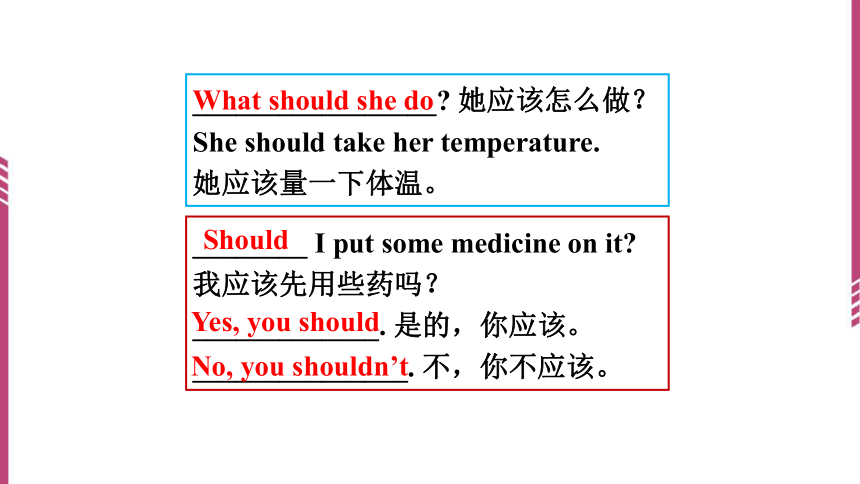
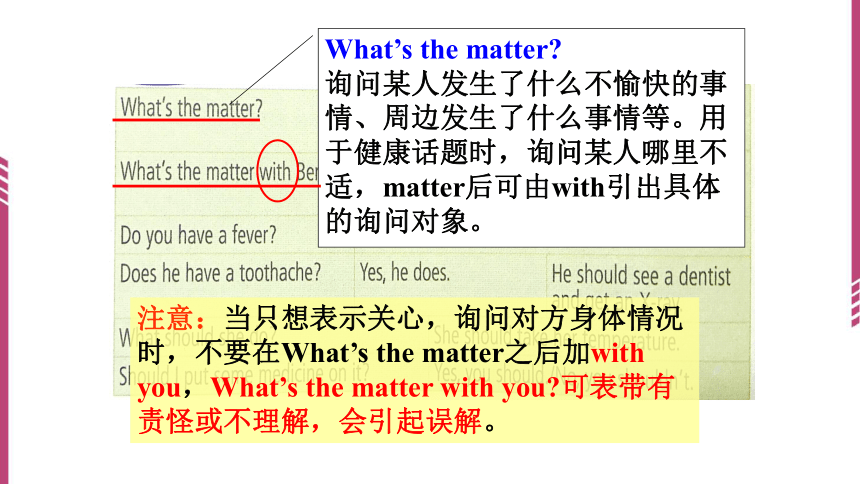
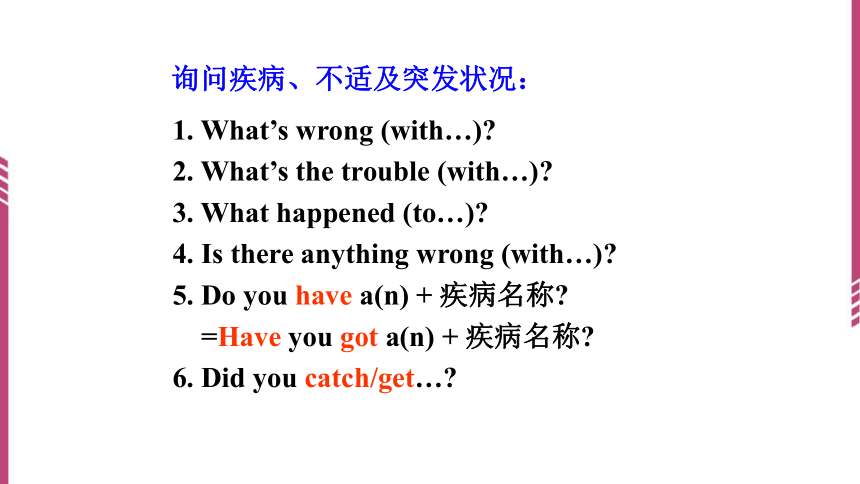
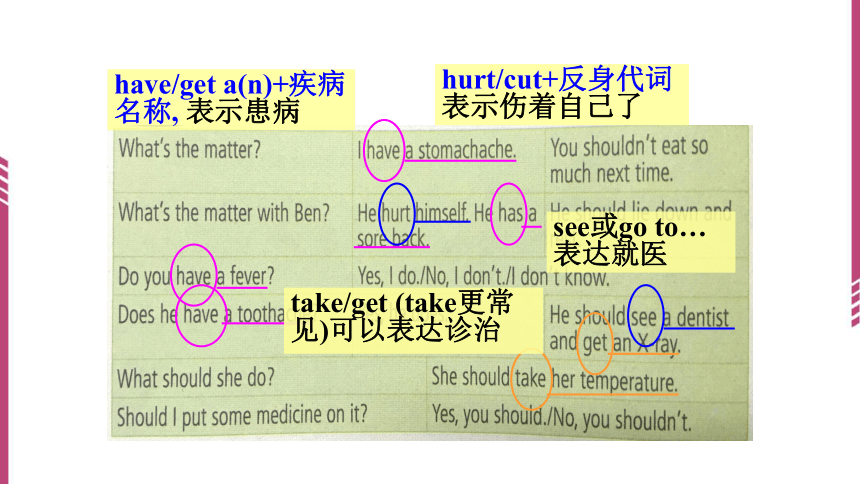
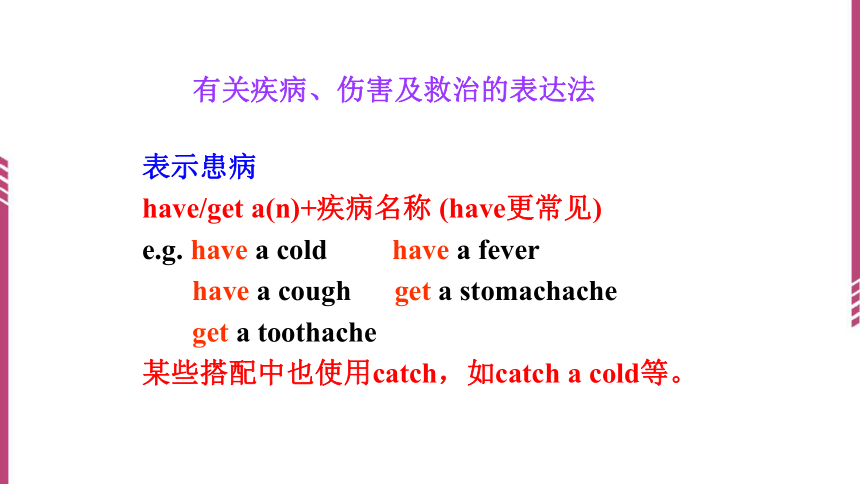
文档简介
(共27张PPT)
Unit 1
What's the matter
To learn to use “have” to talk about health problems
To learn to use modal verb “should/ shouldn’t” for suggestions
To learn to use reflexive pronouns
To give your own advice on certain health problem
________________ 怎么了?
I have a ____________. 我胃疼。
You _________ eat so much next time. 你下次不该吃那么多。
根据所给汉语意思把句子补充完整。
What’s the matter
stomachache
shouldn’t
What’s the matter with Ben 本怎么了?
He ___________. He _____________. 他伤了自己。他背疼。
He should _______________. 他应该躺下休息。
has a sore back
lie down and rest
hurt himself
Do you ____________ 你发烧了吗?
Yes, I do. / No, I don’t. / I don’t know.
是的。/不,我没有。/ 我不知道。
Does he _______________ 他牙痛吗?
Yes, he does. 是的。
He should __________ and get an X-ray.
他应该去看牙医,做X光检查。
have a fever
have a toothache
see a dentist
_________________ 她应该怎么做?
She should take her temperature.
她应该量一下体温。
________ I put some medicine on it
我应该先用些药吗?
_____________. 是的,你应该。
_______________. 不,你不应该。
What should she do
Should
Yes, you should
No, you shouldn’t
What’s the matter
询问某人发生了什么不愉快的事情、周边发生了什么事情等。用于健康话题时,询问某人哪里不适,matter后可由with引出具体的询问对象。
注意:当只想表示关心,询问对方身体情况时,不要在What’s the matter之后加with you,What’s the matter with you 可表带有责怪或不理解,会引起误解。
询问疾病、不适及突发状况:
1. What’s wrong (with…)
2. What’s the trouble (with…)
3. What happened (to…)
4. Is there anything wrong (with…)
5. Do you have a(n) + 疾病名称
=Have you got a(n) + 疾病名称
6. Did you catch/get…
have/get a(n)+疾病名称, 表示患病
hurt/cut+反身代词 表示伤着自己了
take/get (take更常见)可以表达诊治
see或go to…表达就医
有关疾病、伤害及救治的表达法
表示患病
have/get a(n)+疾病名称 (have更常见)
e.g. have a cold have a fever
have a cough get a stomachache
get a toothache
某些搭配中也使用catch,如catch a cold等。
表示不适
get+动词-ed
be/feel+形容词
be/feel tired be/feel sick
be/feel dizzy(晕头转向的)
head feels hot
get hurt get cut in the hand
get hit by a ball
表示伤害
hurt/cut+反身代词
hurt/cut/break+身体具体部位
hurt my leg cut her finger
break his arm
hurt myself
cut himself
表达诊治:take/get…(take更常见)
take one’s temperature take some medicine
take an injection (注射)
take/get an X-ray
表达就医:see…/go to…
see the dentist/doctor go to a doctor
go to (the) hospital
should modal v. (情态动词)后接动词原形, 没有人称和数的变化。用于提出建议劝告别人。
否定形式为should not, 缩写为shouldn’t。
1. — Tom, I have a toothache. Tom, 我牙痛。
— You should see a dentist. 你应当去看牙医。
should
2. — I’m not feeling well these days. I have bad cough.
这些天我身体不适, 老是咳嗽。
— You shouldn’t smoke so much, I think.
我认为你不该抽这么多烟。
3. — Should I put some medicine on it
— Yes, you should. / No, you shouldn’t.
4. — What should she do
— She should take her temperature.
含should的一般疑问句是将should提至主语前;
其简略回答:Yes, 主语(人称代词)+should.
No, 主语(人称代词)+shouldn’t.
1. 可用作宾语,指的是宾语和主语表示同一个或同一些的人或事物。
e.g. Maria bought herself a scarf. Maria给自己买了一条围巾。
We must look after ourselves very well.
我们必须好好照顾自己。
反身代词的用法:
2. 用作表语,指的是表语和主语表示同一个或同一些人或事物。
e.g. She isn’t quite herself today. 她今天身体不太舒服。
反身代词又称为自身代词,表示动作行为反射到行为执行者本身。它还可以在句中起到强调的作用,用以加强语气。反身代词在使用时应注意和它所指的相应的对象在人称、性别、数上保持一致。
第一人称 第二人称 第三人称
单数 myself yourself himself
herself
itself
复数 ourselves yourselves themselves
3. 可用作主语或宾语的同位语,常用来加强语气。
e.g. She herself will fly to London tomorrow.
明天她自己将要坐飞机去伦敦。
I met the writer himself last week.
我上周见到了那位作家本人。
4. 某些固定短语当中。
照顾自己 look after oneself / take care of oneself
自学 teach oneself sth./ learn sth. by oneself
玩得高兴,过得愉快 enjoy oneself
请自用……(随便吃/喝些……)help oneself to sth.
1. 反身代词不能单独做主语,但可以做主语的同位语,起强调作用。
如:我自己能完成作业。
I myself can finish my homework. / I can finish my homework myself.
【温馨提示】
2. 反身代词不能表示“某人的东西”,没有所有格的形式。
某人自己的(东西):one’s own
如:我用我自己的蜡笔画画。
I’m drawing with my own crayons.
1. My grandma can use WeChat (微信). She learns it all by _______ .
A. she B. herself C. her D. hers
(2021贵州毕节)
2. —We'll have the P. E. test next week. I feel a little nervous.
—Relax! Believe in ______ and practice more.
A. you B. your C. yours D. yourself
(2021湖北黄冈)
B
D
3. —Dad, could you please teach ________ English
—Sure! But it's more important to learn it by ______.
my; yourself B. my; you
C. me; you D. me; yourself
(2021山东滨州)
4. Don’t play with the knife, or you’ll cut ________.
A. itself B. yourself C. himself
(2021湖南株洲)
D
B
5. When I face difficulties, I always say to _______, “Never give up!”
A. me B. my C mine D. myself
(2021湖北十堰)
6. —Did your parents have a good time during the trip to Shibing
—Yes. They enjoyed______.
A. they B. them C. theirs D. themselves
(2021贵州黔东南)
D
D
7. Tony, help _______ to some fruit.
A. your B. yourself C. yourselves
(2021黑龙江绥化)
8. Tai chi, part of Chinese culture, is an exercise which helps people improve ______in health.
themselves B. ourselves
C. itself D. myself
(2021云南昆明)
B
A
Fill in the blanks and practice the conversations.
A: I hurt ______ when I played basketball yesterday.
What _______ I do
B: You ______ see a doctor and get an X-ray.
myself
should
should
2. A: _______ the matter
B: My sister and I ______ sore throats. _______ we go to school
A: No, you _________.
What’s
have
Should
shouldn’t
3. A: _____ Mike _____ a fever
B: No, he _______. He _____ a stomachache.
A: He ______ drink some hot tea.
Does
have
doesn’t
has
should
1. Jenny cut herself.
She should (get an X-ray / put some medicine on the cut).
My advice: _________________________.
Circle the best advice for these health problems. Then add your own advice.
Put a bandage (绷带) on it
2. Kate has a toothache.
She should (see a dentist /get some sleep).
My advice: ________________________.
She shouldn’t eat cold food
3. Mary and Sue have colds.
They shouldn’t (sleep/ exercise).
My advice: __________________.
Drink more water
4. Bob has a sore back.
He should (lie down and rest / take his temperature).
My advice: ______________.
Get an X-ray
One student mimes a problem. The other students in your group guess the problem and give advice.
Name Problem Advice
Liu Peng fall down go home and rest
A: What’s the matter Did you hurt yourself playing soccer
B: No, I didn’t.
C: Did you fall down
B: Yes, I did.
D: You should go home and get some rest.
have for talking about health problems.
have + (a) + 病症
A: What’s the matter with Ben
B: He hurt himself. He has a sore back.
A: Do you have a fever
B: Yes, I do. (No, I don’t.)
Should/ shouldn’t for suggestions.
You shouldn’t eat so much next time.
Should I put some medicine on it
Reflexive pronouns
He didn’t think about himself.
Unit 1
What's the matter
To learn to use “have” to talk about health problems
To learn to use modal verb “should/ shouldn’t” for suggestions
To learn to use reflexive pronouns
To give your own advice on certain health problem
________________ 怎么了?
I have a ____________. 我胃疼。
You _________ eat so much next time. 你下次不该吃那么多。
根据所给汉语意思把句子补充完整。
What’s the matter
stomachache
shouldn’t
What’s the matter with Ben 本怎么了?
He ___________. He _____________. 他伤了自己。他背疼。
He should _______________. 他应该躺下休息。
has a sore back
lie down and rest
hurt himself
Do you ____________ 你发烧了吗?
Yes, I do. / No, I don’t. / I don’t know.
是的。/不,我没有。/ 我不知道。
Does he _______________ 他牙痛吗?
Yes, he does. 是的。
He should __________ and get an X-ray.
他应该去看牙医,做X光检查。
have a fever
have a toothache
see a dentist
_________________ 她应该怎么做?
She should take her temperature.
她应该量一下体温。
________ I put some medicine on it
我应该先用些药吗?
_____________. 是的,你应该。
_______________. 不,你不应该。
What should she do
Should
Yes, you should
No, you shouldn’t
What’s the matter
询问某人发生了什么不愉快的事情、周边发生了什么事情等。用于健康话题时,询问某人哪里不适,matter后可由with引出具体的询问对象。
注意:当只想表示关心,询问对方身体情况时,不要在What’s the matter之后加with you,What’s the matter with you 可表带有责怪或不理解,会引起误解。
询问疾病、不适及突发状况:
1. What’s wrong (with…)
2. What’s the trouble (with…)
3. What happened (to…)
4. Is there anything wrong (with…)
5. Do you have a(n) + 疾病名称
=Have you got a(n) + 疾病名称
6. Did you catch/get…
have/get a(n)+疾病名称, 表示患病
hurt/cut+反身代词 表示伤着自己了
take/get (take更常见)可以表达诊治
see或go to…表达就医
有关疾病、伤害及救治的表达法
表示患病
have/get a(n)+疾病名称 (have更常见)
e.g. have a cold have a fever
have a cough get a stomachache
get a toothache
某些搭配中也使用catch,如catch a cold等。
表示不适
get+动词-ed
be/feel+形容词
be/feel tired be/feel sick
be/feel dizzy(晕头转向的)
head feels hot
get hurt get cut in the hand
get hit by a ball
表示伤害
hurt/cut+反身代词
hurt/cut/break+身体具体部位
hurt my leg cut her finger
break his arm
hurt myself
cut himself
表达诊治:take/get…(take更常见)
take one’s temperature take some medicine
take an injection (注射)
take/get an X-ray
表达就医:see…/go to…
see the dentist/doctor go to a doctor
go to (the) hospital
should modal v. (情态动词)后接动词原形, 没有人称和数的变化。用于提出建议劝告别人。
否定形式为should not, 缩写为shouldn’t。
1. — Tom, I have a toothache. Tom, 我牙痛。
— You should see a dentist. 你应当去看牙医。
should
2. — I’m not feeling well these days. I have bad cough.
这些天我身体不适, 老是咳嗽。
— You shouldn’t smoke so much, I think.
我认为你不该抽这么多烟。
3. — Should I put some medicine on it
— Yes, you should. / No, you shouldn’t.
4. — What should she do
— She should take her temperature.
含should的一般疑问句是将should提至主语前;
其简略回答:Yes, 主语(人称代词)+should.
No, 主语(人称代词)+shouldn’t.
1. 可用作宾语,指的是宾语和主语表示同一个或同一些的人或事物。
e.g. Maria bought herself a scarf. Maria给自己买了一条围巾。
We must look after ourselves very well.
我们必须好好照顾自己。
反身代词的用法:
2. 用作表语,指的是表语和主语表示同一个或同一些人或事物。
e.g. She isn’t quite herself today. 她今天身体不太舒服。
反身代词又称为自身代词,表示动作行为反射到行为执行者本身。它还可以在句中起到强调的作用,用以加强语气。反身代词在使用时应注意和它所指的相应的对象在人称、性别、数上保持一致。
第一人称 第二人称 第三人称
单数 myself yourself himself
herself
itself
复数 ourselves yourselves themselves
3. 可用作主语或宾语的同位语,常用来加强语气。
e.g. She herself will fly to London tomorrow.
明天她自己将要坐飞机去伦敦。
I met the writer himself last week.
我上周见到了那位作家本人。
4. 某些固定短语当中。
照顾自己 look after oneself / take care of oneself
自学 teach oneself sth./ learn sth. by oneself
玩得高兴,过得愉快 enjoy oneself
请自用……(随便吃/喝些……)help oneself to sth.
1. 反身代词不能单独做主语,但可以做主语的同位语,起强调作用。
如:我自己能完成作业。
I myself can finish my homework. / I can finish my homework myself.
【温馨提示】
2. 反身代词不能表示“某人的东西”,没有所有格的形式。
某人自己的(东西):one’s own
如:我用我自己的蜡笔画画。
I’m drawing with my own crayons.
1. My grandma can use WeChat (微信). She learns it all by _______ .
A. she B. herself C. her D. hers
(2021贵州毕节)
2. —We'll have the P. E. test next week. I feel a little nervous.
—Relax! Believe in ______ and practice more.
A. you B. your C. yours D. yourself
(2021湖北黄冈)
B
D
3. —Dad, could you please teach ________ English
—Sure! But it's more important to learn it by ______.
my; yourself B. my; you
C. me; you D. me; yourself
(2021山东滨州)
4. Don’t play with the knife, or you’ll cut ________.
A. itself B. yourself C. himself
(2021湖南株洲)
D
B
5. When I face difficulties, I always say to _______, “Never give up!”
A. me B. my C mine D. myself
(2021湖北十堰)
6. —Did your parents have a good time during the trip to Shibing
—Yes. They enjoyed______.
A. they B. them C. theirs D. themselves
(2021贵州黔东南)
D
D
7. Tony, help _______ to some fruit.
A. your B. yourself C. yourselves
(2021黑龙江绥化)
8. Tai chi, part of Chinese culture, is an exercise which helps people improve ______in health.
themselves B. ourselves
C. itself D. myself
(2021云南昆明)
B
A
Fill in the blanks and practice the conversations.
A: I hurt ______ when I played basketball yesterday.
What _______ I do
B: You ______ see a doctor and get an X-ray.
myself
should
should
2. A: _______ the matter
B: My sister and I ______ sore throats. _______ we go to school
A: No, you _________.
What’s
have
Should
shouldn’t
3. A: _____ Mike _____ a fever
B: No, he _______. He _____ a stomachache.
A: He ______ drink some hot tea.
Does
have
doesn’t
has
should
1. Jenny cut herself.
She should (get an X-ray / put some medicine on the cut).
My advice: _________________________.
Circle the best advice for these health problems. Then add your own advice.
Put a bandage (绷带) on it
2. Kate has a toothache.
She should (see a dentist /get some sleep).
My advice: ________________________.
She shouldn’t eat cold food
3. Mary and Sue have colds.
They shouldn’t (sleep/ exercise).
My advice: __________________.
Drink more water
4. Bob has a sore back.
He should (lie down and rest / take his temperature).
My advice: ______________.
Get an X-ray
One student mimes a problem. The other students in your group guess the problem and give advice.
Name Problem Advice
Liu Peng fall down go home and rest
A: What’s the matter Did you hurt yourself playing soccer
B: No, I didn’t.
C: Did you fall down
B: Yes, I did.
D: You should go home and get some rest.
have for talking about health problems.
have + (a) + 病症
A: What’s the matter with Ben
B: He hurt himself. He has a sore back.
A: Do you have a fever
B: Yes, I do. (No, I don’t.)
Should/ shouldn’t for suggestions.
You shouldn’t eat so much next time.
Should I put some medicine on it
Reflexive pronouns
He didn’t think about himself.
同课章节目录
- Unit 1 What's the matter?
- Section A
- Section B
- Unit 2 I'll help to clean up the city parks.
- Section A
- Section B
- Unit 3 Could you please clean your room?
- Section A
- Section B
- Unit 4 Why don't you talk to your parents?
- Section A
- Section B
- Unit 5 What were you doing when the rainstorm came
- Section A
- Section B
- Review of Units 1-5
- Unit 6 An old man tried to move the mountains.
- Section A
- Section B
- Unit 7 What's the highest mountain in the world?
- Section A
- Section B
- Unit 8 Have you read Treasure Island yet?
- Section A
- Section B
- Unit 9 Have you ever been to a museum?
- Section A
- Section B
- Unit 10 I've had this bike for three years.
- Section A
- Section B
